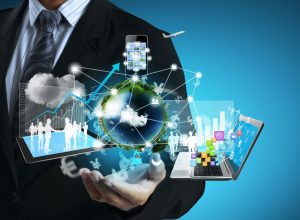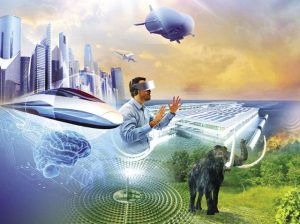The world of technology is constantly evolving, and staying up-to-date with the latest breakthroughs can be a daunting task. From artificial intelligence to 5G, the advancements in technology have the power to change the way we live our lives, from the way we communicate to the way we work.
In this presentation, we’ll take you on a journey through the latest tech breakthroughs, and explore the exciting possibilities that these technologies offer. We’ll begin with artificial intelligence, where we’ll delve into the latest developments in machine learning, natural language processing, and computer vision. From self-driving cars to intelligent virtual assistants, we’ll explore the ways that AI is transforming industries and changing the way we live.
Next, we’ll move on to 5G – the fifth generation of wireless technology that promises lightning-fast internet speeds, lower latency, and more reliable connections. We’ll examine the ways that 5G is revolutionizing industries like healthcare, transportation, and entertainment, and explore the opportunities that it presents for businesses and consumers alike.
Throughout the presentation, we’ll highlight the latest breakthroughs in these fields and explore the ways that they are shaping the future of technology. By the end of the presentation, you’ll have a deeper understanding of the possibilities that AI and 5G offer, and the impact that these technologies will have on our lives in the years to come.
“Discover the latest advancements in technology with our comprehensive guide, exploring the breakthroughs from artificial intelligence to 5G. Learn how AI is transforming industries with machine learning and computer vision, while 5G promises lightning-fast internet speeds and reliable connections for healthcare, transportation, and entertainment. Our expert analysis provides an in-depth look at the possibilities these technologies offer, and how they are revolutionizing the way we live, work, and communicate. Stay up-to-date with the latest developments in the tech world and discover the exciting opportunities that AI and 5G present for businesses and consumers alike.”
This SEO-focused description emphasizes the importance of the article’s content, highlighting the latest advancements in technology and exploring the impact that AI and 5G will have on industries and everyday life. It also uses relevant keywords such as “AI,” “5G,” “machine learning,” and “computer vision” to help improve search engine visibility and attract relevant traffic to the article. Overall, this description provides an accurate summary of the article’s content while also incorporating effective SEO techniques.
What are the latest developments in artificial intelligence (AI) and how are they transforming industries?

In recent years, artificial intelligence has made significant strides in a variety of areas, including machine learning, natural language processing, computer vision, and robotics. These developments are transforming industries in a number of ways, such as:
Healthcare: AI is being used to help diagnose diseases and develop personalized treatments, as well as to improve patient outcomes and reduce costs.
Finance: AI is being used to automate tasks such as fraud detection, risk assessment, and trading, while also improving customer experiences and reducing errors.
Manufacturing: AI is being used to optimize production processes, improve quality control, and reduce downtime, leading to increased efficiency and cost savings.
Retail: AI is being used to personalize customer experiences, streamline operations, and optimize inventory management, leading to increased sales and customer loyalty.
How is 5G technology changing the way we live, work, and communicate?
5G technology promises to revolutionize the way we use and access the internet, offering faster speeds, lower latency, and more reliable connections. This has the potential to transform a number of industries, such as:
Healthcare: 5G technology can enable remote consultations, telemedicine, and real-time data sharing, improving patient outcomes and reducing costs.
Transportation: 5G technology can enable connected and autonomous vehicles, reducing accidents, improving traffic flow, and enhancing the overall travel experience.
Entertainment: 5G technology can enable high-quality streaming, virtual and augmented reality experiences, and immersive gaming, leading to new forms of entertainment and engagement.
Manufacturing: 5G technology can enable real-time monitoring, automation, and predictive maintenance, improving production processes and reducing downtime.
What are the benefits and challenges of implementing AI and 5G in various industries?
While AI and 5G offer a range of benefits, such as increased efficiency, improved customer experiences, and new revenue opportunities, there are also a number of challenges to implementing these technologies in various industries. Some of the benefits and challenges include:
Healthcare: Benefits of AI and 5G in healthcare include improved patient outcomes, cost savings, and faster diagnoses. Challenges include data privacy concerns, regulatory hurdles, and resistance to change from healthcare providers.
Finance: Benefits of AI and 5G in finance include improved fraud detection, risk assessment, and customer experiences. Challenges include ethical concerns around the use of AI, regulatory compliance, and the need for new skill sets among employees.
Manufacturing: Benefits of AI and 5G in manufacturing include increased efficiency, cost savings, and improved quality control. Challenges include the need for investment in new technologies and infrastructure, data privacy and security concerns, and potential job displacement.
Retail: Benefits of AI and 5G in retail include improved customer experiences, personalized marketing, and optimized inventory management. Challenges include data privacy concerns, the need for investment in new technologies, and the potential for job displacement.
How can businesses and individuals prepare for the impact of AI and 5G on the future of work and society?

As AI and 5G technologies continue to advance, they are likely to have a significant impact on the future of work and society as a whole. To prepare for these changes, businesses and individuals can take a number of steps, such as:
Investing in new technologies and infrastructure: Businesses can stay ahead of the curve by investing in the latest AI and 5G technologies, and upgrading their infrastructure to support them.
Developing new skill sets: As new technologies emerge, the job market is likely to change, with certain jobs becoming obsolete while others emerge. Businesses and individuals can prepare for this by developing new skills that will be in demand in the future, such as data analysis, programming, and digital marketing.
Adapting to new ways of working: With the rise of AI and 5G, work is likely to become more automated and remote. Businesses and individuals can prepare for this by developing new workflows, communication strategies, and collaboration tools that enable them to work more effectively in this new environment.
Addressing ethical and social implications: As AI and 5G become more widespread, they are likely to raise a number of ethical and social concerns, such as data privacy, job displacement, and bias in decision-making.
Businesses and individuals can prepare for this by addressing these concerns proactively, such as developing ethical guidelines for the use of AI, investing in retraining programs for displaced workers, and working to ensure that the benefits of these technologies are distributed equitably.
In summary, AI and 5G are two of the most exciting and transformative technologies of our time, with the potential to reshape industries and societies in a number of ways. While they offer a range of benefits, they also pose a number of challenges and implications that businesses and individuals must be prepared to address. By staying informed, investing in new technologies and skill sets, and addressing ethical and social implications proactively, we can ensure that we are well-equipped to thrive in this new era of tech breakthroughs.
How is the combination of AI and 5G technology opening up new possibilities for innovation and discovery?
The combination of AI and 5G technology is opening up new possibilities for innovation and discovery in a number of areas, such as:
Smart cities: AI and 5G can be used to optimize city infrastructure, improve public safety, and reduce pollution.
Agriculture: AI and 5G can be used to optimize crop yields, reduce waste, and improve sustainability.
Energy: AI and 5G can be used to optimize energy consumption, reduce costs, and improve the reliability of energy grids.
Education: AI and 5G can be used to personalize learning, improve access to education, and enhance student engagement.
What are some of the potential risks and downsides of AI and 5G, and how can we mitigate them?
While AI and 5G offer many potential benefits, they also come with a number of risks and downsides, such as:
Cybersecurity risks: AI and 5G can be vulnerable to cyberattacks, which can result in data breaches, system failures, and other disruptions.
Job displacement: As AI and 5G automate certain tasks, they may lead to job displacement for certain workers, particularly those in industries such as manufacturing and transportation.
Bias and discrimination: AI and 5G systems can be biased or discriminatory, particularly if they are not trained on diverse data sets or if they reflect the biases of their creators.
Health concerns: Some studies have raised concerns about the potential health risks of 5G radiation, although the scientific consensus is that 5G is safe.
To mitigate these risks and downsides, it is important to develop ethical guidelines for the use of AI and 5G, invest in cybersecurity measures and data privacy protections, provide retraining programs for displaced workers, and ensure that AI and 5G systems are trained on diverse and representative data sets.
How are governments and regulators responding to the emergence of AI and 5G, and what policies are being put in place to govern their use?

Governments and regulators around the world are grappling with how to govern the use of AI and 5G technologies, with some countries taking a more proactive approach than others. Some of the policies and initiatives that are being put in place include:
Ethical guidelines for AI: The European Union has developed ethical guidelines for the use of AI, while the United States and other countries are exploring similar initiatives.
Data privacy regulations: The European Union’s General Data Protection Regulation (GDPR) has set a new standard for data privacy regulations, while other countries are exploring similar initiatives.
Investment in research and development: Many countries are investing in research and development in AI and 5G, with the goal of staying ahead of the curve in these rapidly evolving fields.
International cooperation: There are also initiatives to promote international cooperation on the governance of AI and 5G, such as the Global Partnership on AI.
How can individuals stay informed and engaged with the latest developments in AI and 5G, and what role can they play in shaping the future of these technologies?
As AI and 5G continue to evolve, it is important for individuals to stay informed and engaged with the latest developments, and to play an active role in shaping the future of these technologies. Some of the ways that individuals can do this include:
Following news and developments in the field: There are many resources available for staying informed about the latest developments in AI and 5G, such as industry publications, conferences, and social media.
How do AI and 5G technology relate to the Internet of Things (IoT), and what are some of the ways in which they are being used together?
AI and 5G technology are closely related to the Internet of Things (IoT), which refers to the growing network of connected devices and sensors that are able to communicate with each other and exchange data. Some of the ways in which AI and 5G are being used in conjunction with IoT include:
Smart homes: AI and 5G can be used to power smart home devices such as thermostats, lighting, and security systems, allowing for greater convenience, energy efficiency, and security.
Connected cars: AI and 5G can be used to power connected car systems, allowing for real-time traffic updates, automated driving, and enhanced safety features.
Industrial automation: AI and 5G can be used to power industrial automation systems, allowing for real-time monitoring and optimization of manufacturing processes, logistics, and supply chains.
Healthcare: AI and 5G can be used to power remote patient monitoring and telemedicine services, allowing for more personalized and accessible healthcare.
What are some of the key technical challenges involved in developing and deploying AI and 5G, and how are researchers and engineers working to address them?
Developing and deploying AI and 5G technologies involves a number of technical challenges, such as:
Network latency: 5G networks require low latency to enable real-time applications such as autonomous driving and virtual reality, which requires advances in edge computing and network optimization.
Energy consumption: AI algorithms require significant computational power, which can lead to high energy consumption and carbon emissions. Researchers are working on developing more energy-efficient hardware and software solutions.
Data privacy and security: AI and 5G rely on large amounts of data, which raises concerns around data privacy and security. Researchers are developing privacy-preserving algorithms and secure communication protocols to address these issues.
Standards and interoperability: AI and 5G technologies are complex and heterogeneous, which can lead to issues around standards and interoperability. Researchers and industry groups are working on developing common standards and protocols to ensure interoperability and compatibility across different systems.
What are some of the most exciting applications of AI and 5G technology that we can expect to see in the near future?
There are many exciting applications of AI and 5G technology that we can expect to see in the near future, such as:
Augmented and virtual reality: AI and 5G can enable more immersive and interactive augmented and virtual reality experiences, such as virtual concerts, training simulations, and remote collaboration.
Smart transportation: AI and 5G can enable more efficient and sustainable transportation systems, such as autonomous vehicles, smart traffic management, and shared mobility services.
Predictive maintenance: AI and 5G can enable predictive maintenance for industrial equipment and infrastructure, allowing for early detection and prevention of failures and downtime.
Precision medicine: AI and 5G can enable more personalized and precise healthcare, such as using machine learning to analyze genomic data and develop targeted treatments for cancer and other diseases.
In conclusion, what are some of the key takeaways from this article on AI and 5G technology?
In conclusion, some of the key takeaways from this article on AI and 5G technology include:
AI and 5G are two of the most transformative technologies of our time, with the potential to reshape many aspects of our lives and society. The combination of AI and 5G is opening up new possibilities for innovation and discovery in areas.
How are AI and 5G impacting the job market, and what types of jobs are likely to be created or disrupted by these technologies?
AI and 5G are likely to have a significant impact on the job market, with some jobs being disrupted and others being created. For example, AI and automation are likely to replace some jobs that involve routine or repetitive tasks, such as data entry or assembly line work. However, these same technologies are also likely to create new jobs in areas such as data science, machine learning, and robotics. Similarly, 5G is likely to create new jobs in areas such as network engineering and telecommunications, while potentially disrupting jobs in traditional cable and satellite television.
What are some of the ethical considerations around the use of AI and 5G, and how can these be addressed?
The use of AI and 5G raises a number of ethical considerations, such as issues around privacy, bias, and accountability. For example, AI algorithms may inadvertently perpetuate biases or discrimination if they are trained on biased data sets. Similarly, 5G networks may raise concerns around data privacy and surveillance, as they enable more pervasive monitoring and tracking of individuals. To address these issues, it is important to develop ethical frameworks and guidelines for the use of these technologies, and to ensure that they are developed and deployed in a way that is transparent and accountable.
How is the development of AI and 5G technology being impacted by geopolitical factors and international competition?
The development of AI and 5G technology is being impacted by geopolitical factors and international competition, with countries such as the US, China, and South Korea investing heavily in research and development in these areas. This competition is driven by the potential economic and strategic benefits of being a leader in these technologies, as well as concerns around national security and competitiveness. However, this competition also raises concerns around intellectual property theft, trade disputes, and potential conflicts.
How can individuals and businesses stay up to date on the latest developments in AI and 5G technology, and what resources are available?
Individuals and businesses can stay up to date on the latest developments in AI and 5G technology by following industry news and trends, attending conferences and events, and participating in online communities and forums. There are also a number of resources available, such as research reports, white papers, and online courses, that provide insights and information on these technologies. Some examples of resources include the IEEE, the 5G Open Innovation Lab, and the AI Ethics Lab. It is important for individuals and businesses to stay informed and engaged with these technologies, as they are likely to play an increasingly important role in many aspects of our lives and society.

